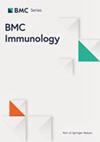Atypical memory B cells increase in the peripheral blood of patients with breast cancer regardless of lymph node involvement
IF 2.9
4区 医学
Q3 IMMUNOLOGY
引用次数: 0
Abstract
Breast cancer is the most common cancer in females. The immune system has a crucial role in the fight against cancer. B and T cells, the two main components of the adaptive immunity, are critical players that specifically target tumor cells. However, B cells, in contrast to T cells, and their role in cancer inhibition or progression is less investigated. Accordingly, in this study, we assessed and compared the frequency of naïve and different subsets of memory B cells in the peripheral blood of patients with breast cancer and healthy women. We found no significant differences in the frequencies of peripheral CD19+ B cells between the patients and controls. However, there was a significant decrease in the frequency of CD19+IgM+ B cells in patients compared to the control group (P=0.030). Moreover, the patients exhibited higher percentages of atypical memory B cells (CD19+CD27‒IgM‒, P=0.006) and a non-significant increasing trend in switched memory B cells (CD19+CD27+IgM‒, P=0.074). Further analysis revealed a higher frequency of atypical memory B cells (aMBCs) in the peripheral blood of patients without lymph node involvement as well as those with a tumor size greater than 2cm or with estrogen receptor (ER) negative/progesterone receptor (PR) negative tumors, compared with controls (P=0.030, P=0.040, P=0.031 and P=0.054, respectively). Atypical memory B cells (CD19+CD27‒IgM‒) showed a significant increase in the peripheral blood of patients with breast cancer compared to the control group. This increase seems to be associated with tumor characteristics. Nevertheless, additional research is necessary to determine the precise role of these cells during breast cancer progression乳腺癌患者外周血中的非典型记忆 B 细胞增多,与淋巴结受累无关
乳腺癌是女性最常见的癌症。免疫系统在抗癌过程中起着至关重要的作用。B 细胞和 T 细胞是适应性免疫的两个主要组成部分,它们是专门针对肿瘤细胞的关键角色。然而,与 T 细胞相比,B 细胞及其在癌症抑制或进展中的作用却鲜有研究。因此,在这项研究中,我们评估并比较了乳腺癌患者和健康女性外周血中原始 B 细胞和不同亚群记忆 B 细胞的频率。我们发现,患者和对照组外周 CD19+ B 细胞的频率没有明显差异。然而,与对照组相比,患者体内 CD19+IgM+ B 细胞的频率明显下降(P=0.030)。此外,患者的非典型记忆 B 细胞(CD19+CD27-IgM-,P=0.006)比例较高,而转换记忆 B 细胞(CD19+CD27+IgM-,P=0.074)的增加趋势不明显。进一步分析发现,与对照组相比,无淋巴结受累、肿瘤大小超过2厘米或雌激素受体(ER)阴性/孕激素受体(PR)阴性的患者外周血中非典型记忆B细胞(aMBCs)的频率更高(分别为P=0.030、P=0.040、P=0.031和P=0.054)。与对照组相比,乳腺癌患者外周血中的非典型记忆 B 细胞(CD19+CD27-IgM-)显著增加。这种增加似乎与肿瘤特征有关。然而,要确定这些细胞在乳腺癌进展过程中的确切作用,还需要进行更多的研究。
本文章由计算机程序翻译,如有差异,请以英文原文为准。
求助全文
约1分钟内获得全文
求助全文
来源期刊

BMC Immunology
医学-免疫学
CiteScore
5.50
自引率
0.00%
发文量
54
审稿时长
1 months
期刊介绍:
BMC Immunology is an open access journal publishing original peer-reviewed research articles in molecular, cellular, tissue-level, organismal, functional, and developmental aspects of the immune system as well as clinical studies and animal models of human diseases.
 求助内容:
求助内容: 应助结果提醒方式:
应助结果提醒方式:


